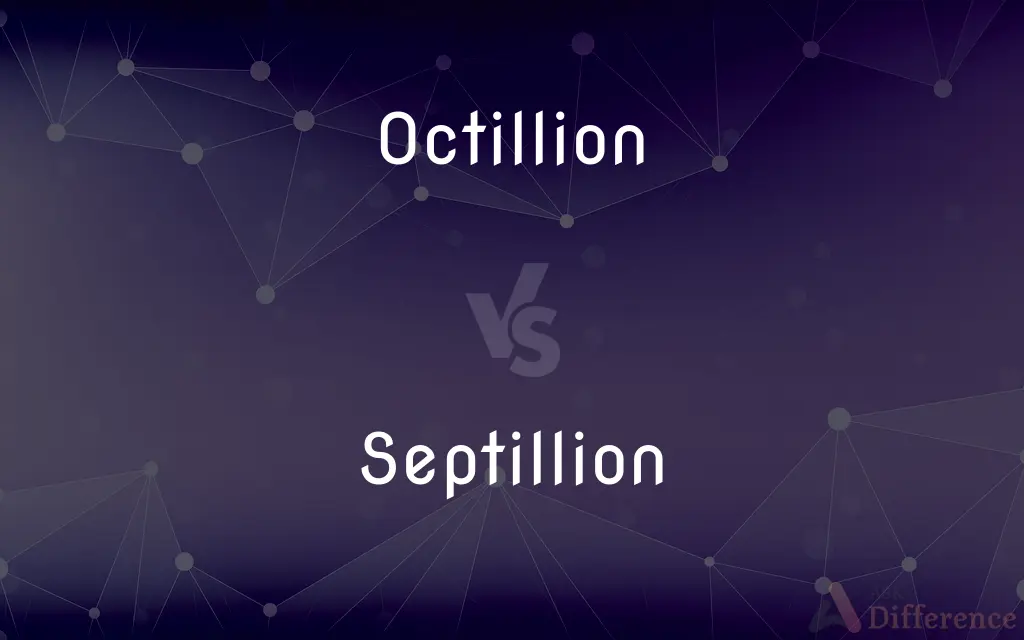Octillion vs. Septillion — What's the Difference?
By Fiza Rafique & Urooj Arif — Updated on May 6, 2024
An octillion is a number represented as 10 to the 27th power in the U.S., while a septillion is smaller, being 10 to the 24th power.

Difference Between Octillion and Septillion
Table of Contents
ADVERTISEMENT
Key Differences
An octillion is a very large number equaling 1 followed by 27 zeros in the U.S. numbering system. On the other hand, a septillion is slightly smaller, equaling 1 followed by 24 zeros.
In the short scale used by the U.S., an octillion is 1,000 times bigger than a septillion. Both represent huge quantities primarily used in scientific calculations and fields like astronomy.
In the British long scale system, which is less commonly used today, the terms differ, with an octillion having 48 zeros and a septillion 42 zeros. The short scale is more prevalent globally, especially in finance and science.
While octillions and septillions are rarely encountered in everyday use, they help quantify astronomical data, global economies, and computing terms like data storage.
Comparison Chart
Numerical Value
10^27 (1 followed by 27 zeros)
10^24 (1 followed by 24 zeros)
ADVERTISEMENT
Short Scale
U.S., worldwide usage
U.S., worldwide usage
Long Scale
10^48 (1 followed by 48 zeros)
10^42 (1 followed by 42 zeros)
Use Case
Astronomy, computing, economics
Finance, computing, science
Size Comparison
1,000 times larger than a septillion
Smaller than an octillion
Compare with Definitions
Octillion
A value used in extremely large data sets.
The computing power required was measured in octillions of bytes.
Septillion
Useful for describing large scales in computing.
Storing that amount of data requires septillions of memory addresses.
Octillion
In the long scale, 1 followed by 48 zeros.
Historical texts once referred to an octillion using a different scale.
Septillion
A measurement unit for immense quantities.
The data volume was in septillions of bytes.
Octillion
An astronomical quantity for vast distances.
The galaxies are separated by octillions of kilometers.
Septillion
An extremely large number, but smaller than an octillion.
While huge, a septillion is dwarfed by an octillion.
Octillion
A massive numerical representation, rarely used in everyday contexts.
Theoretical calculations sometimes involve octillions.
Septillion
The number equal to 1 followed by 24 zeros in the short scale.
Economists estimated the world's debt in septillions of dollars.
Octillion
The number equal to 1 followed by 27 zeros in the short scale.
Scientists measured the distance to the star in octillions of meters.
Septillion
In the long scale, 1 followed by 42 zeros.
The ancient astronomers couldn't comprehend a septillion.
Octillion
The cardinal number that is equal to 1027.
Septillion
The cardinal number equal to 1024.
Octillion
Chiefly British The cardinal number that is equal to 1048.
Septillion
Chiefly British The cardinal number equal to 1042.
Octillion
A thousand trillion trillion, a billion billion billion: 1 followed by 27 zeros, 1027.
Septillion
A trillion trillion: 1 followed by 24 zeros, 1024.
Octillion
A trillion quintillion: 1 followed by 48 zeros, 1048.
Septillion
A billion quintillion: 1 followed by 42 zeros, 1042.
Octillion
According to the French method of numeration (which method is followed also in the United States) the number expressed by a unit with twenty-seven ciphers annexed. According to the English method, the number expressed by a unit with forty-eight ciphers annexed. See Numeration.
Septillion
According to the French method of numeration (which is followed also in the United States), the number expressed by a unit with twenty-four ciphers annexed. According to the English method, the number expressed by a unit with forty-two ciphers annexed. See Numeration.
Common Curiosities
What scale systems define these terms?
The short scale is used in the U.S. and globally, while the long scale is used less often, especially in historical contexts.
What is an octillion?
An octillion is a number with a value of 10^27 in the short scale, or 1 followed by 27 zeros.
Do octillions and septillions differ in the British long scale?
Yes, an octillion is 10^48, and a septillion is 10^42 in the long scale.
How much bigger is an octillion than a septillion?
An octillion is 1,000 times larger than a septillion in the short scale.
What comes after an octillion?
After an octillion comes a nonillion, which is 10^30 in the short scale.
Which term is more frequently encountered?
Septillion might appear more often than octillion, but both are rarely used outside specialized contexts.
Where are octillions and septillions used?
They are used in scientific calculations, astronomy, computing, and global economic measurements.
Why are such large numbers needed?
Large numbers like octillions and septillions quantify astronomical distances, data storage needs, and global economic metrics.
What is a septillion?
A septillion is a number with a value of 10^24 in the short scale, or 1 followed by 24 zeros.
Are octillions and septillions part of SI units?
No, these are numerical terms, but not specifically part of the International System of Units.
How does scientific notation relate to these terms?
Scientific notation uses powers of 10, making it easier to write and comprehend these very large numbers.
Are octillions and septillions ever used in daily life?
No, these terms are generally too large for everyday use and are mainly relevant in scientific contexts.
How does the long scale differ from the short scale?
The long scale typically adds three zeros for each step, while the short scale increases by multiples of 1,000.
Can we comprehend the size of an octillion?
Most people cannot easily grasp such vast numbers, as they exceed common human experience.
Is there a practical use for these terms?
Yes, they help convey immense quantities in computing and astronomy.
Share Your Discovery

Previous Comparison
Permissible vs. Allowable
Next Comparison
Service vs. FavourAuthor Spotlight
Written by
Fiza RafiqueFiza Rafique is a skilled content writer at AskDifference.com, where she meticulously refines and enhances written pieces. Drawing from her vast editorial expertise, Fiza ensures clarity, accuracy, and precision in every article. Passionate about language, she continually seeks to elevate the quality of content for readers worldwide.
Co-written by
Urooj ArifUrooj is a skilled content writer at Ask Difference, known for her exceptional ability to simplify complex topics into engaging and informative content. With a passion for research and a flair for clear, concise writing, she consistently delivers articles that resonate with our diverse audience.
















































